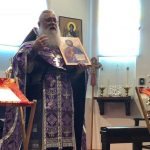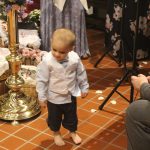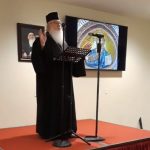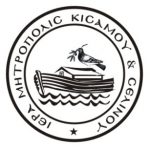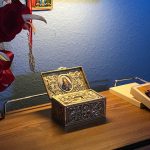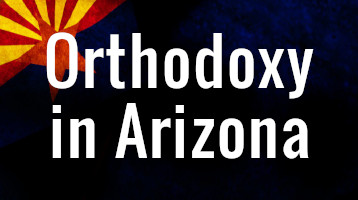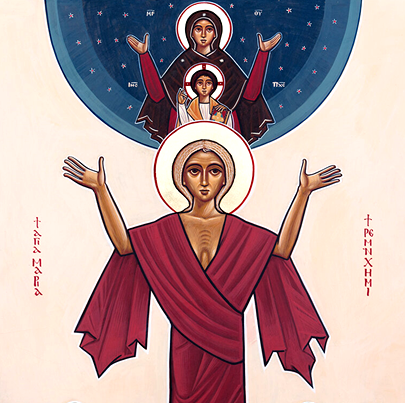by Fr. John Whiteford This video provides an excellent presentation by Archpriest John Whiteford, chief pastor of St. Jonah Orthodox Church (ROCOR) in Spring, Texas, on how Orthodox Christians should view Bible study. Fr. John is a Bible scholar, and author of the book, Sola Scriptura: An Orthodox Analysis of the Cornerstone of Reformation Theology. What follows is not a comprehensive guide to how to the study the Bible, but it is a collection of previous articles into one post, so that they can be easily accessed. First, a talk that covers why we should study the Scriptures, as well as some of the basics about how we should do so. The Importance of Reading the Bible in Christian … [Read more...]
Instructional Divine Liturgy to be held on Sunday, May 26th
All Saints of North America Orthodox Church will have an Instructional Divine Liturgy on Sunday, May 26th at 9 am. There will be no sermon or homily, but instead detailed explanations of each section of the Divine Liturgy will be explained with their Biblical significance. Although there is no sermon, the instructional period for each section will make the service slightly longer than normal. The Instructional Divine Liturgy is offered once every other year, and is not recorded, so if you wish to participate, arrive early! Extra materials for the study of Divine Liturgy are linked to below: PDF of this week's bulletin with Liturgy outline Commentary on the Divine Liturgy by St. … [Read more...]
How to Help and Support Young Mothers in Church
Our little parish has many young children, toddlers, and infants, and mothers who are working hard to make sure these precious ones are in Church. Here's a way you can help them! I remember the deep, sinking feeling in the pit of my stomach each time we pulled into the church parking lot. I would look back at my precious toddler’s face and wonder how I was going to make it through the two-hour liturgy. How much time would I spend chasing him around today? How often would I have to take him out to the back so he wouldn’t distract others? Would I get a chance to pray at all today? Would things ever get better? Taking young children to church is just plain hard. I have three young … [Read more...]
Egg-celent! Pysanki Egg Class a Big Hit!
On Saturday, April 13 parishioners of All Saints of North America Orthodox Church gathered for a special Pysanki Egg Decorating Class. Done in the Czech style, the class produced some amazing traditional, and amazingly creative, eggs in anticipation of Pascha! We will definitely be repeating this class in the future. This class was eggs-actly what the doctor ordered for the end of Lent! A special thanks to Nicola Hazen for hosting and teaching this eggs-tra special class! A gallery of photos from the class is below. … [Read more...]
Inaugural Mission Development Conference
On Saturday, February 2nd, 2019 the inaugural Mission Development Conference and Satellite Training workshop was held in Glendale, AZ. The conference was sponsored by St. Lawrence Orthodox Church in Felton, CA, and their priest, Fr. Thaddaeus Hardenbrook, was one of the conference speakers and leaders. Fr. John A. Peck led the sessions by identifying important mission growth principles. Fr. Thaddaeus discussed the relationship of anthropology and Orthodox phroenema to mission work. A break for lunch at the local Buffalo Wild Wings was a happy success, and after lunch, Paul Rathbone, of the Theotokos "Joy of All Who Sorrow" and St. John Maximovitch Orthodox Mission spoke about Home Fellowship … [Read more...]
The Men who Failed to Paganize the Origins of Christmas
by John Sanidopoulos Every Christmas season, the usual myths are hauled out and distributed for popular consumption. You know them. We’ve all heard or read them. That Christmas celebrations were stolen from the Romans The Christmas tree is a pagan hangover That other gods had virgin births That Yule and the mistletoe are all about Odin These falsehoods are repeated often and loudly, under the guise of being “historical truths.” And strangely they still stump most Christians, who are then filled with doubt about what they believe. Of course, these myths were designed to elicit precisely this sort of reaction from believers. All of them were invented in the 18th- and … [Read more...]
Sermon on the Occasion of an Earthquake
In light of the terrible earthquake in Anchorage, Alaska, we offer this homily by St. John Chrysostom, Archbishop of Constantinople, on the occasion of an earthquake in his day. Have you seen God’s power, have you seen God’s love for mankind? His power, because He shook the world; His love, because He made the tottering world firm again; or rather, you saw both His power and His love in both. For the earthquake showed His power, and its cessation showed His love, because He shook the earth and made the world fast again, because He set it upright when it was rocking and about to fall. The earthquake has gone by, but let the fear remain; that tossing has run its course, do not let … [Read more...]
2018 Vicariate Spiritual Retreat
On Saturday, October 13, 2018 at the Cathedral of St. George in Daly City, CA, the Vicariate held the 3rd Annual Spiritual Retreat of the Vicariate for Palestinian/Jordanian Orthodox Christian Communities in the USA. The speakers were Archimandrite Damaskinos Alazrai (who gave his presentation in Arabic), Fr. Thaddaeus Hardenbrook, Fr. John A. Peck, and Fr. Leo Arrowsmith whose presentations are embedded below. Although it is not below, Master Iconographer Fr. Luke Dingman also gave a short presentation. The text of Fr. John's presentation is below the videos. … [Read more...]
A Letter from Metropolitan Amfilochios of Kissamos and Selinon to ASONA
We just today received this note from his eminence Amfilochios, Metropolitan of Kissamos and Selinon. Let's continue to pray for him, and for the faithful of the new St. Nikiphoros the Leper Church! … [Read more...]
Blessing the Chapel of St. Nikiphoros the Leper
On Wednesday, September 26, 2018, the holy relics of St. Nikiphoros the Leper were brought to the Hermitage Chapel of St. Nikiphoros for a special blessing. The Paraklesis service to St. Nikiphoros was celebrated, and the holy relics were made available for veneration. On Sunday, September 30, the holy relics will be brought to All Saints of North America Orthodox Church for veneration, two days before the Church of St. Nikiphoros will be consecrated by several hierarchs and many faithful, including the Patriarchs of Constantinople, Alexandria, Jerusalem, and many more hierarchs. The parishioners of ASONA made a special gift to help the building up of the Church of St. Nikiphoros, and … [Read more...]
- « Previous Page
- 1
- …
- 16
- 17
- 18
- 19
- 20
- …
- 24
- Next Page »

